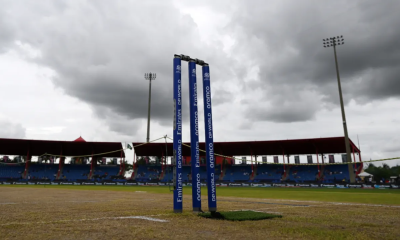Foreign News
Bomb threats cause evacuations at multiple US statehouses

State capitol buildings in at least six states were evacuated on Wednesday after being targeted by bomb threats.
A Kentucky secretary of state spokeswoman said the threat came in “a mass email sent to several” state offices across the US. BBC has reviewed the email, which targeted at least 24 statehouses and appears to have caused many to close at the start of new legislative sessions.
No bombs have been discovered, and the FBI is investigating.
The threatening email claims that “multiple explosives” had been “well hidden” inside the statehouses. It says the bombs would detonate “in a few hours”. The sender promises that many will be killed.
The FBI said that it was investigating the bomb threats, but it had “no information to indicate a specific and credible threat”. “The FBI takes hoax threats very seriously because it puts innocent people at risk,” the law enforcement agency said.
The threat was delivered at the start or just ahead of new legislative sessions, which brought many state lawmakers back to their statehouse offices.
Kentucky Governor Andy Beshear posted on X, formerly Twitter, that Kentucky State Police had evacuated the state capitol after the threat was sent to the secretary of state’s office. He added that everyone was safe, and that his office is “aware of similar threats made to other offices across the country”.
Police cleared the building in less than three hours before declaring that it was safe for personnel to return. Kentucky lawmakers just started their 60-day legislative session on Tuesday.
Gabriel Sterling, a spokesman for Georgia’s secretary of state, wrote on X was aware of the threats made to statehouses across the US. “Do not jump to conclusions as to who is responsible,” he said. “There will be chaos agents sowing discord for 2024. They want to increase tensions. Don’t let them,” Mr Sterling added.
Other states – including Wyoming, Oklahoma, Nebraska, Missouri and Maryland – also received threats on Wednesday but did not close, according to the Associated Press.
These are not the only threats the US public has contended with recently, however.
Over the holidays, multiple officials were targeted by so-called “swatting” calls at their homes. The prank calls to emergency services allege crises, such as an active shooter or hostage situation, to force a Swat team to be deployed.
Members of Congress faced swatting calls just before Christmas. Billionaire George Soros and Texas Attorney General Ken Paxton were targeted in recent days. Maine’s secretary of state, Shenna Bellows, dealt with a swatting incident one day after she ruled that Donald Trump is ineligible to appear on the state’s election ballot.
Multiple states recently increased penalties for creating this kind of disruption, and lawmakers in other states are considering legislation that would do the same.
(BBC)
Foreign News
Chinese nationals arrested with gold bars and $800,000 cash in DR Congo
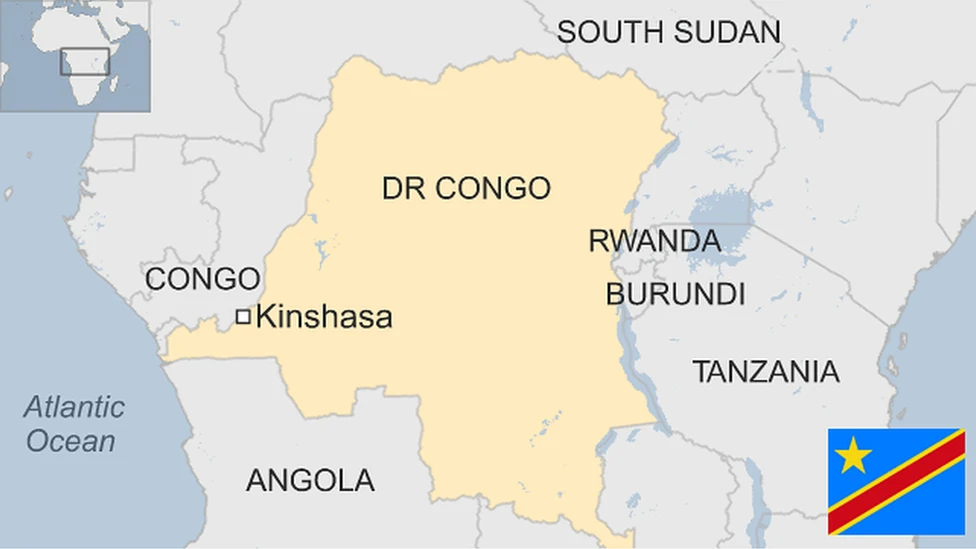
Three Chinese nationals have been arrested with 12 gold bars and $800,000 (£650,000) in cash in eastern Democratic Republic of Congo, officials say.
The gold and money was hidden under the seats of the vehicle they were travelling in, according to Jean Jacques Purusi, the governor of South Kivu province.
He said the operation to arrest the men had been kept secret after the recent release of another group of Chinese nationals accused of running an illegal gold mine in the area.
Eastern DR Congo has abundant reserves of gold, diamonds and the minerals used to make batteries for mobile phones and electric vehicles.
This mineral wealth has been plundered by foreign groups since the colonial era and is one of the main reasons why the region has been plagued by instability for the last 30 years.
Militia groups control many of the mines in eastern DR Congo and their leaders become wealthy by selling it to middle-men.
Purusi said some of these dealers in precious metals enjoyed good relations with influential people in the capital, Kinshasa, and this was why the mission to carry out these latest arrests had to be kept quiet.
He said they had been acting on a tip-off and that the gold and money was only found after a meticulous search of the vehicle in the Walungu area not far from the border with Rwanda.
He did not say exactly how much gold had been seized.
Last month, the governor told reporters he was shocked to hear that 17 Chinese nationals, who had been arrested on allegations they had been running an illegal gold mine, had been freed and allowed to return to China.
He said this undermined efforts to clean up DR Congo’s notoriously murky mineral sector.
They owed $10m in taxes and fines to the government, the Reuters news agency quotes him as saying.
The Chinese embassy has not commented on the allegations.
The arrests come as fighting continues to flare in the neighbouring North Kivu province, where a Rwanda backed rebel group has captured large areas of territory.
Last month, DR Congo said it was suing Apple over the use of “blood minerals”, prompting the tech giant to say it had stopped getting supplies from both DR Congo and neighbouring Rwanda.
Rwanda has denied being a conduit for the export of illegal minerals from DR Congo.
In their lawsuit, lawyers acting for the Congolese government alleged that the minerals taken from conflict areas was then “laundered through international supply chains”.
“These activities have fuelled a cycle of violence and conflict by financing militias and terrorist groups and have contributed to forced child labour and environmental devastation,” they said.
[BBC]
Business
Motorbike-sized tuna sold to Tokyo sushi restaurateurs for $1.3m
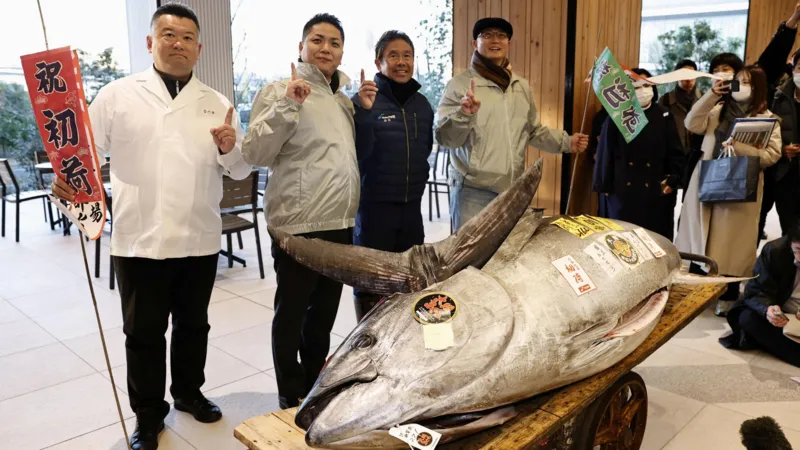
Sushi restaurateurs in Tokyo say they have paid 207m yen ($1.3m; £1m) for a bluefin tuna which is about the size and weight of a motorbike.
The sale is the second highest price ever paid at the annual new year auction at Toyosu Fish Market in the Japanese capital.
Onodera Group, which had the winning bid, said the tuna – which weighs in at 276kg (608lb) – would be served at its Michelin-starred Ginza Onodera restaurants, as well as Nadaman restaurants across the country.
“The first tuna is something meant to bring in good fortune,” Onodera official Shinji Nagao told reporters after the auction, news agency AFP reported.
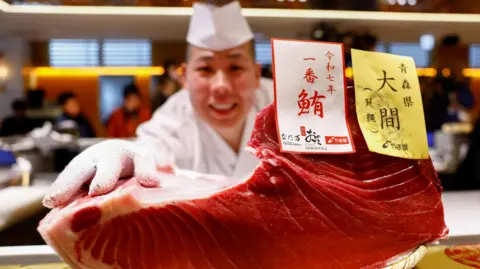
Mr Nagao added that he hoped people would eat the tuna – caught off the Aomori region in northern Japan – and “have a wonderful year”.
The group has paid the top price in the Ichiban Tuna auction for five years straight.
Last year, it forked out 114m yen for the top tuna.
The highest auction price since comparable records began in 1999 was 333.6m yen in 2019 for a 278kg bluefin.
It was paid by self styled Japanese ‘tuna King’ and sushi restaurant Kiyoshi Kimura.
Toyosu fish market, which opened in 1935, claims to be the biggest fish market in the world, and is known for pre-dawn daily tuna auctions.
But tuna was not the only catch on offer on Sunday, with Hokkaido sea urchins also fetching a record-breaking 7m yen according to the Japan Times.
[BBC]
Foreign News
Guatemalan forces arrive in Haiti to fight gangs

A contingent of 150 Guatemalan soldiers has arrived in Haiti, tasked with helping to restore order amid the chaos wrought by armed gangs.
A first group of 75 soldiers arrived on Friday and another 75 on Saturday, all drafted from the military police, according to Guatemala’s government.
A state of emergency has been in place across the Caribbean nation for months as the government battles violent gangs that have taken control of much of the capital Port-au-Prince.
The forces are in Haiti to boost a United Nations-backed security mission led by Kenya that has so far failed to prevent violence from escalating.
Kenya sent nearly 400 police officers in June and July last year to help combat the gangs.
This was the first tranche of a UN-approved international force that will be made up of 2,500 officers from various countries.
A small number of forces from Jamaica, Belize and El Salvador are also in Haiti as part of the mission and the US is the operation’s largest funder.
In March 2024, armed gangs stormed Haiti’s two biggest prisons, freeing around 3,700 inmates.
The Ouest Department – a region including Port-au-Prince – was originally put under a state of emergency on 3 March, after escalating violence gripped the capital.
Chronic instability, dictatorships and natural disasters in recent decades have left Haiti the poorest nation in the Americas.
In 2021, President Jovenel Moise was assassinated by unidentified gunmen in Port-au-Prince.
Since then the country has been wracked by economic chaos, little functioning political control and increasingly violent gang warfare.
[BBC]
-

 Features7 days ago
Features7 days agoThe recovery has begun
-

 Features6 days ago
Features6 days agoAKD faces challenging year ahead
-

 Editorial7 days ago
Editorial7 days agoBashing bureaucrats
-

 Editorial6 days ago
Editorial6 days agoA kiri-kekiri issue
-

 Sports6 days ago
Sports6 days agoSt. Sebastian’s dominate at Bambalapitiya
-
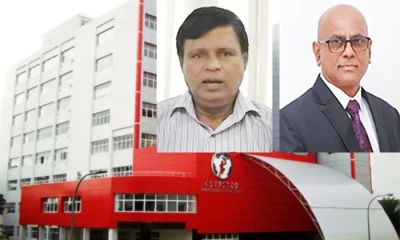
 News7 days ago
News7 days agoFM circular violated, Rs. 4 bn paid to CPC workers
-

 Features5 days ago
Features5 days agoThey, too, had a ball …Down Under
-
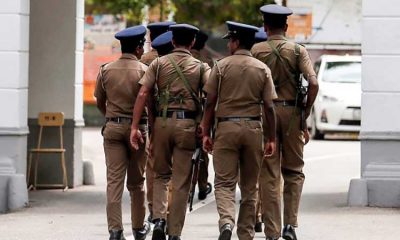
 News3 days ago
News3 days agoReshuffle of senior cops on the cards






